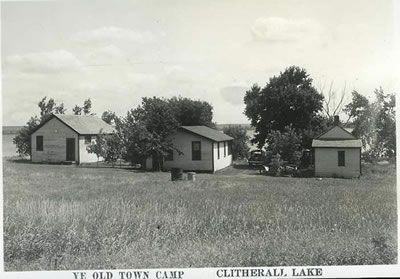
Columns written by Frances Grinnell Kirschner October 15, 1936 April 6, 1939 Known also as Old Town. Named for Major George B. Clitherall, U.S. Land Officer. Was settled in 1865.—The community flourished for many years, but gradually disintegrated, and with the building of New Clitherall the Old Town has gradually disappeared." The sign-writer had needed all the arts of his trade to condense into those brief lines seventy-four years of Old Town’s history. Only one who was native to the place could realize all that lay between the lines. Being native, we looked at it and sighed, seeing the changing panorama of the years it covered. How often we had seen in imagination, as we listened to the stirring tales of that early settlement, the covered wagon caravan of only forty-one souls driving over the brow of the hill for the first time. But the field road was impassable so we retraced our way a quarter of a mile to another sign reading: "Ye Olde Towne Campe," which we could not help viewing with distaste as an attempt to make the genuine appear more so. Old Town being really old needs no extra e-s to emphasize its claim to fame. Probably the thing that impressed us most during the visit home was the fact that nothing was as we had expected it to be. In other days the winding road had known only the clatter of wagon-wheels, and later the elegance of rubber tired buggies. We were far from home when the astonishing automobile made its first appearance. Ten years ago we had found the old place echoing to a constant roar of traffic, truck after truck careening down the hill and around the corner and on to Battle Lake; tourist cabins already springing up, here and there, like first hardy plantings. And so we had expected to find it last week, forgetting what that wide straight highway would mean to the places it missed. We found an Old Town returned to its original peace and quiet, but for the Northwest Air Line planes that thunder overhead at regular intervals. We found a lake whose beach had receded two hundred feet, with piers that led far out into what had been lovely shining water ten years ago. We found a school-house unchanged outwardly, bearing its insignia: "District No. 1" but brightly modern within. Instead of the long recitation bench and charts and battered seats we remembered we saw single seats, a piano, heatrola, cunning little chairs and tables for the younger ones. We went out hastily, unwilling to lose a loved memory. And then there was the old home itself, and the sight of it tugged at every heart-string. It looked so exactly the same, with its little latticed porches and every window giving upon a room we know so well—so well. Impossible that the door would never open again to frame grandmother'’ dear figure. And just then the kitchen door did open and out frolicked a group of little folks, so gay and engaging and friendly that as we talked with them we could feel all our resentment at the idea of strangers in the old house melting away. We hope the old walls will be as kindly protective to these little ones as they ever were to us.
|
| Allen | Hankins | Jensen | Kirschner | Grinnell | Whiting |
| Home | Bibliography | Hulet | Talcott | Hemstreet | Contact Me |
